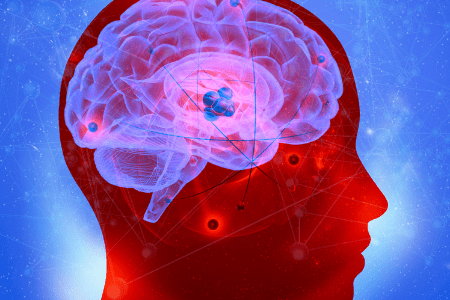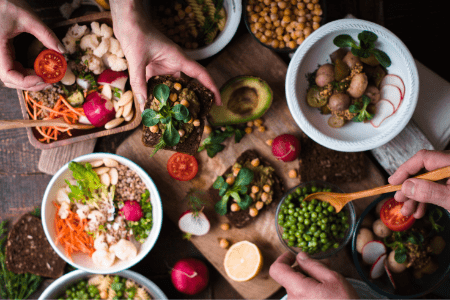At my last visit to the doctor, she noticed that I’d lost weight. I told her I’d been doing intermittent fasting, which was unfamiliar to her. When I explained it she said, “so, basically you skip breakfast? That doesn’t sound very good.”
I’ll admit that at first glance, intermittent fasting doesn’t sound healthy. Skipping meals and restricting your eating to certain times of the day rings of starving yourself or obsessing over food to an unhealthy degree.
It calls to mind the Old Hollywood diets that starlets were forced to adhere to, by studio executives.
To lose weight for The Wizard of Oz,  Judy Garland was put on a diet of black coffee, chicken soup and 80 cigarettes a day.
Judy Garland was put on a diet of black coffee, chicken soup and 80 cigarettes a day.
Jean Harlow supposedly subsisted on a diet of orange juice for breakfast, two tomatoes and if she was lucky, a piece of grilled meat for lunch and dinner.
supposedly subsisted on a diet of orange juice for breakfast, two tomatoes and if she was lucky, a piece of grilled meat for lunch and dinner.
In the modern era when so many people are (and should be!) embracing body positivity, it sounds arcane for anyone to promote skipping meals as a viable diet plan.
In my experience though, intermittent fasting makes staying fit a lot easier. It also makes life easier in general, because worrying about eating enough nutrition to sustain myself is no longer an issue. I am more aware than ever that eating throughout the day is not the “weigh” (shameless pun) to go.
Don’t just take my word for it though; the scientific research in favor of intermittent fasting has been piling up in recent years. Studies are finding that not only can this method of eating help you to lose weight, but the changes your body undergoes during fasting periods can lead to better heart health, better brain health, and better skin too.
Here are the facts you need to know about intermittent fasting, what this revolutionary method of eating could potentially do for you, and a few tips to get you started.

What is intermittent fasting?
Intermittent fasting or time-restricted eating is a method of eating in which you limit your blood insulin levels by cycling between eating periods and fasting periods. In contrast with a diet, which puts the emphasis on what you eat and how much you eat, intermittent fasting (IF) is an eating pattern which focuses more on when you eat. Just eat normally during your eating window, as healthfully as possible, but don’t worry about calories. Your weight will slowly start to regulate itself and if you’re overweight you will start to lose excess fat.
There are many different ways to do intermittent fasting, but the most popular is the 16/8 method, which involves an eating period of 8 hours a day and a 16-hour fasting period. Other IF techniques include the 5/2 method (5 days of eating normally and 2 non-consecutive days where you limit your eating to 500-600 calories) or even OMAD (one meal a day).
 What Happens to Our Bodies When We Fast?
What Happens to Our Bodies When We Fast?
The real magic behind intermittent fasting is what happens to our bodies during fasting periods. While more research on the effects of intermittent fasting is needed, so far studies have shown that fasting periods help to decrease insulin levels and insulin sensitivity, blood pressure and inflammation and promote cellular regeneration, which is thought to affect overall health and longevity.
Dr. Mindy Pelz, best-selling author, health coach, and chiropractor, explains the biological processes behind IF. She says that when we eat in a typical pattern, eating several meals a day, our body spends much of its energy towards digestion. Instead, when we fast, our body has a chance to put that energy towards renewing itself. “When you take food out of the equation, now there’s this whole chemical reaction that’s going to occur in your body.” Dr. Pelz explains.
The benefits of intermittent fasting happen throughout your fasting period, depending on the length of the fast. Eight to ten hours after your last meal, your insulin levels start to decrease, allowing fat cells to release sugar for our bodies to turn into energy. Twelve hours after your last meal, the growth hormone kicks in. This is important for your body as it ages because typically we produce less of the growth hormone beyond the age of 30. Growth hormone helps you burn fat, build muscle and slow the aging process.
At around 13-15 hours after your last meal, our insulin has dropped and our bodies start to create energy from fat stores rather than sugars, which can lead to weight loss. After 17 hours of fasting, a process known as autophagy occurs which is when our body turns towards its own cells for fuel. In autophagy, toxins and dead cells are removed and recycled which in turn promotes cellular regeneration.
Together, all of these processes can lead to a number of benefits for your body and your overall health.
THE BENEFITS OF Intermittent Fasting:
Great Skin

You probably already know the link between the foods you eat and the state of your skin. A diet full of dairy, sugar, and simple carbohydrates can lead to acne and dehydration, even wrinkles and sagging, but do you know why? It’s because they’re high glycemic foods, meaning that they cause your blood sugar to spike and your insulin levels to increase.
This in turn leads to inflammation and elevated hormones that promote oil gland activity, resulting in acne. The increased inflammation also leads to a loss of collagen, with a process called Glycation, during which sugar molecules attach to collagen proteins and break them down. Wrinkling and sagging result from a loss of collagen.
Since intermittent fasting lowers your blood sugar and insulin levels, reduces inflammation and encourages the growth of new cells, it’s no wonder studies have shown that intermittent fasting can help control acne as well as keep your skin firmer and younger, longer.
Better Brain Health
Intermittent fasting has been found to improve neurological health in animals, so while more research is needed, it’s thought that IF can also have the same impact on humans. Studies conducted on mice have demonstrated that fasting can lead to improvements in brain structure and function as well as increased generation of nerve cells that improve cognitive abilities and fight against neurodegenerative disorders such as Alzheimer’s and Parkinson’s disease. This, combined with the anti-inflammatory benefits of IF, means that with further research we may be able to unlock the ability to heal and protect our brains as we age with time restricted eating.
Better Heart Health
Intermittent fasting typically leads to weight loss and the loss of belly fat, which is already good news for anyone concerned about their heart health. But aside from weight loss, intermittent fasting can improve your cardiovascular health in other ways. Research has demonstrated that periods of fasting can lead to a 20% reduction in overall cholesterol levels, particularly LDL which is the ‘bad’ cholesterol and as much as a 32% decrease in triglycerides. Lower cholesterol overall means a lowered risk of cardiovascular diseases such as heart attacks, coronary heart disease and stroke which means that intermittent fasting could be a great tool for improving your overall heart health.
Reduced Inflammation
Chronic inflammation has been linked to everything from arthritis to multiple sclerosis to cancer and it’s imperative for our health and longevity that we seek out ways to reduce inflammation in our bodies. Studies have shown that fasting can lead to a reduction of inflammatory immune cells known as monocytes. Monocytes can cause tissue damage but were significantly reduced following a fasting period. One study of 50 healthy adults found that after one month of intermittent fasting they experienced a significant decrease in inflammatory markers. The science is suggesting that time restricted eating just might be to the key to reducing inflammation and avoiding a number of chronic and fatal illnesses as we age.
No More Dieting
Losing weight is simple in principle: consume fewer calories than you burn in a typical day. It’s the dieting part that’s difficult! Weighing your food and counting calories at every meal can start to feel like a chore, a full time job and a bit of an unhealthy obsession, making it tougher. I think this is where a lot of people struggle with losing weight. I definitely lost weight when I calorie counted, but eating low calories foods and analyzing every morsel I ate made eating a joyless task; and I usually ended up falling off the wagon and feeling bad about it. Not really any way to live.
Intermittent fasting is really more of an undiet than a diet. It’s a great way to cut calories without having to obsess over what you are eating or think too hard about it. Eliminating my usual nut butter and chia seed laden bowl of oatmeal at breakfast automatically cut around 500 of my calories each day so when I do eat, I no longer feel the need to obsessively count or deny myself the things that I want. Rather than a diet, it’s more of a lifestyle change, which experts say is the best way to lose weight and keep it off.
Intermittent fasting has also led me to think about food as fuel, which helps me make better choices over all. When I’m finally ready to tuck into my first meal of the day, I’m more inclined to choose to fuel up with healthy, nutrient dense foods that will keep my body going all the way through to the end of my next fasting period.
Tips for Success:
If you’re interested in trying out intermittent fasting, here are a few tips that have helped me in my journey.
Eat Mindfully
 Intermittent fasting isn’t a magic bullet for weight loss, especially if you overeat or make poor meal choices during your eating periods. While I do find that I have a lot more freedom to eat what I want on IF, I still try to maintain a healthy plant based diet of nutritionally dense foods while getting enough, but not too many calories during my eating cycles. Even though intermittent fasting allows you to eat bigger meals, try to be mindful of portion size and not stuff yourself during your eating periods. Not only can it lead you to eat too many calories but it can also result in digestive issues like stomachache or heartburn. Keeping your portions normal is the key to weight loss success with IF.
Intermittent fasting isn’t a magic bullet for weight loss, especially if you overeat or make poor meal choices during your eating periods. While I do find that I have a lot more freedom to eat what I want on IF, I still try to maintain a healthy plant based diet of nutritionally dense foods while getting enough, but not too many calories during my eating cycles. Even though intermittent fasting allows you to eat bigger meals, try to be mindful of portion size and not stuff yourself during your eating periods. Not only can it lead you to eat too many calories but it can also result in digestive issues like stomachache or heartburn. Keeping your portions normal is the key to weight loss success with IF.
Drink up
This sounds like a no brainer, but drinking lots of water can really help you get through fasting periods more easily and curb that hunger. Not only does it keep you full but it’s good for your body and your skin too!
If water doesn’t have enough kick, you don’t have to shy away from your usual morning drink. I can’t live without my 8am coffee and as much as I wish I could drink it black, I just can’t. When I first began intermittent fasting I thought it would mean that I’d have to learn to love black coffee or skip it all together, but many dedicated IF lovers agree that ingesting anything less than 50 calories is not enough to really break your fast. So I kept on drinking coffee with a little bit of cream and found that it really made my fasting periods a whole lot easier to get through.
Be Kind to Yourself
I think one of the best tips for any diet or eating plan is ‘be kind to yourself’. If you beat yourself up every time you fall off the wagon, you’re only making it tougher to climb back on. I stick to 16:8 most days, but when I get a brunch invite that’s outside my eating window, I go for it! Most mornings when I wake up, food is the furthest thing from my mind but every now and then I wake up ravenous, so I eat something. Listen to your body. Do what feels right.
And if you fall short, remember the iconic words spoken by Vivien Leigh as Scarlett O’Hara in Gone With the Wind: “tomorrow is another day”.
So if you’re ready to stop dieting and start living while still losing weight, intermittent fasting just might be the lifestyle change you’ve been looking for. Not only can it help you look and feel great and improve your overall health, but it may even help you achieve a healthier relationship with food, your body and yourself.
To read more about the relationship between the foods we eat and skin health, see: The Many Uses of Herbs and Spices for Beautiful Skin.




